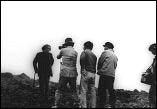|
|
 |
製作:小川プロダクション Production Company : Ogawa Productions |
| 「峠は決定を強いる所だ、峠には決別のための明るい憂愁が流れている…」これは昭和22年に詩誌「至上律」に発表された詩人、真壁仁の作である。真壁氏は山形在住の詩人であり、小川を山形に向かわせた重要人物の一人であり、小川に「真の百姓の顔」を発見させた人物である。当時70歳を迎えた真壁を記念して詩碑が建立されることになった。小川はこれをモチーフに「峠」を撮る。それは小川自身の「三里塚」との「決別のための憂愁」でもある。一方、詩人真壁にとって「峠」は戦争体験と戦後の新しい生きる道との「峠」であった。詩人は農耕の神である蔵王にまつわる神話と、遠からぬ過去の「水争い」について老人から聞きながら、村の農業史を解き明かそうとする。それは真壁にとって百姓として、そして詩人として「自己史を日本の農業史として書こう」という強い意志の表明でもある。小川は、藁の傘と簑を着用する真壁の姿を克明に描写することで詩人=百姓としての誇りをカメラに捉え、彼自身の「峠」をも越えたのである。 | " The pass is a place that forces decisions, that flows with the clear melancholy of parting. " So goes a short poem by Makabe Jin published in the poetry journal Shijoritsu in 1947. Makabe was a Yamagata poet who played an important role in Ogawa's move to that prefecture; he was the person who caused Ogawa to discover the " face of the true peasant farmer. " A memorial stone inscribed with a poem had been dedicated to Makabe on the occasion of his 70th birthday. Ogawa filmed Magino Story--Pass using that poem as the motif. It referred to Ogawa's own " clear melancholy of parting " from Sanrizuka. On the other hand, for Makabe the pass signified the bridging of a gap between the experience of war and the new direction of the postwar era. Makabe wanted to bring the history of the village to light via stories of the agricultural Gods in the Zao region, and through the old people's stories of the struggles over the distribution of water among their rice fields that were common not so long ago. It is an expression of Makabe's strong desire as both peasant farmer and poet to " write a personal history that becomes a history of Japanese agriculture. " In capturing the peasant-poet's pride through his detailed depiction of Makabe, dressed in a straw cloak against the rain and carrying a straw umbrella, Ogawa crossed a " pass " all of his own. |